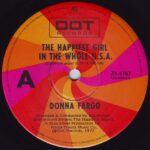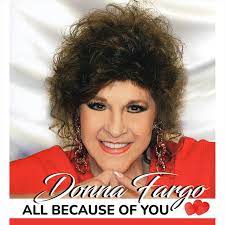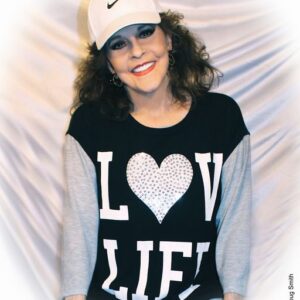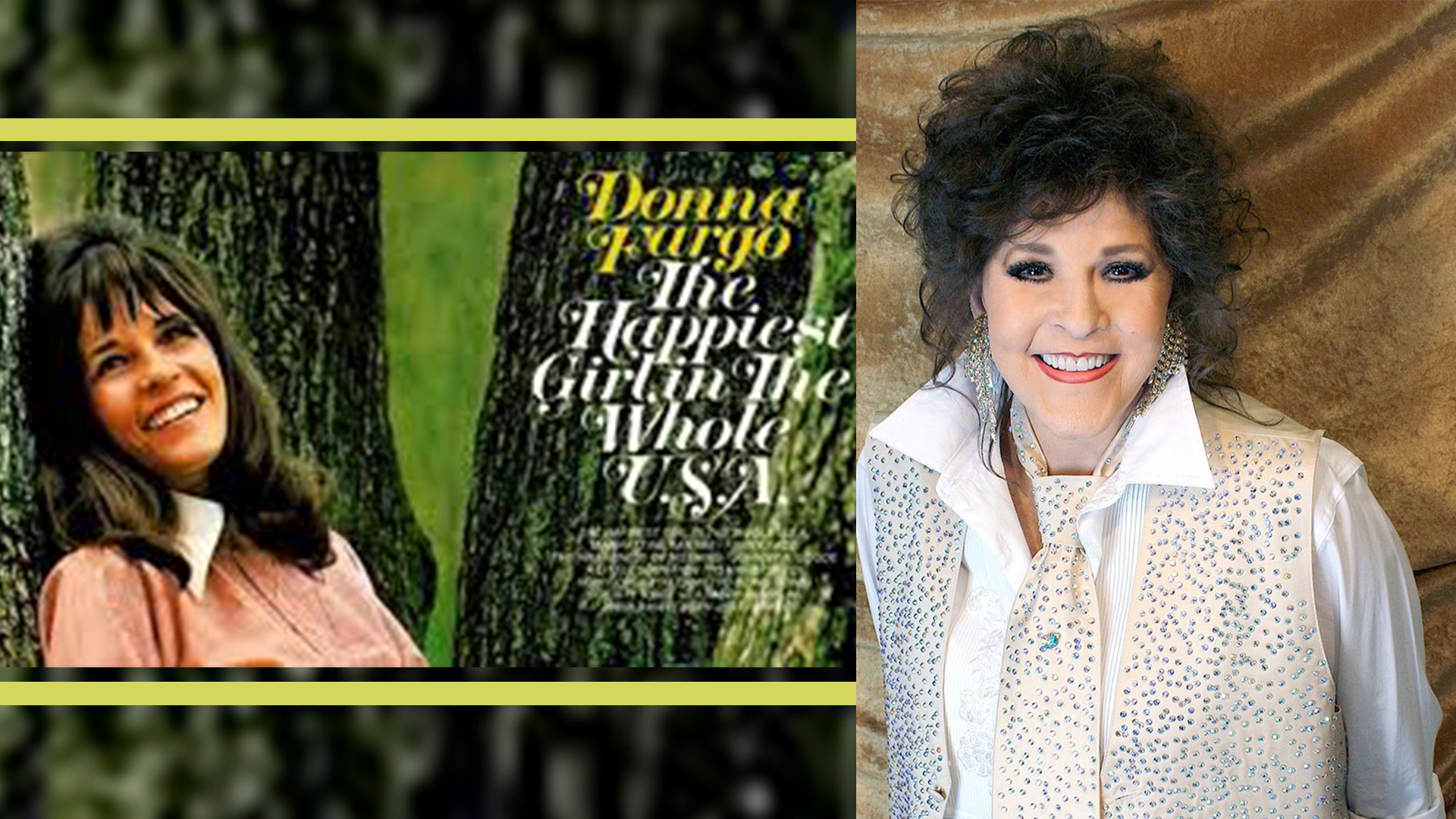In November of 1972, I was eight years old, and my grandparents lived about a mile away from our house in Valdosta, Georgia. The Macy’s Thanksgiving Parade in New York City was coming on television, and between our licking beaters of cake or pudding, I remember my grandmother’s alto voice yelling, “Y’all get in here. Donna Fargo’s gonna sing ‘The Happiest Girl in the Whole U.S.A.’ from one of the parade floats”.
It was certainly a song we all knew because our mom had bought the 33 1/3 speed album and played it over and over on our record player. We knew all the words. We also knew all the words to “Funny Face”, and through the years, I think we memorized the words to all the songs on that album. I imagined the record player’s needle wore grooves in the vinyl disc. Today, I still have that Donna Fargo album I play on my record player, and I listen to her CDs in my SUV and on my office computer.
Recently, I wondered if Donna Fargo was still “The Happiest Girl in the Whole U.S.A” and after interviewing her, I learned she most definitely is. Donna tells us in one of her books, “If you’re not happy, you’re cheating yourself.” Now, fifty years after several major #1 hits, several awards, and much more, Donna has written over two thousand greeting cards and over eight books for Blue Mountain while continuing to write and record music. Her most recent CD is All Because of You and has some incredible songs such as “One of the Good Guys”. Released by PrimaDonna Entertainment, it was produced by Donna’s long-time husband/producer Stan Silver who unfortunately passed away from COVID complications during the pandemic. Donna also suffered with COVID, previously had two strokes, and has fought a long battle with M.S., but despite having those huge mountains to climb, she has remained positive and has continued to work.


When Stan died from COVID complications during the pandemic, Donna struggled and one day spoke to God and said, “I can’t go on like this, God. Just give me some kind of sign that Stan is okay, that he’s in heaven. If you can’t help me, just take me on. As I walked from the kitchen to the bedroom, the light on his side of the bed was on. Hadn’t been turned on in months. I said, ‘God, I didn’t turn that light on,’ and he said, ‘Well, you did ask me for a sign.’”
The second incident that happened was when Donna found herself walking down the hall, opening a cabinet for no reason at all, and pulling out a bag of CDs. She wasn’t looking for them and consciously somewhat unaware of what she was doing. She listened to the CDs, perfectly mixed and recorded at different times, and realized she was being directed to release them. Donna said, “These two supernatural experiences really saved my life. God is so good. So good. We serve a mighty God. I cannot put into words how much these supernatural experiences helped me and drew me closer to God and I am so thankful.”
 Donna grew up Yvonne Vaughn outside Mount Airy, North Carolina, but she didn’t personally know another famous Mt. Airy citizen, Andy Griffith. Someone in the music business recommended she change her name to Donna Fargo and she did. When growing up in Mt. Airy, though, Donna worked in the tobacco fields and dress shops in town and was active in her high school. She played basketball, was head of the cheerleading squad, served as the president of her class, and was even homecoming queen her junior year. Her earliest memory of singing was performing “Mansion over the Hilltop” in church when a spirit-filled woman in the community shouted out. Donna stopped singing briefly but finished the song and felt it was a pivotal moment that fueled her desire to be a singer because of the impact it had on the lady. She went on after her high school graduation to High Point University and majored in English and Psychology (minoring in Philosophy and Religion) and then moved to California to live with her older brother and work on securing a teaching credential.
Donna grew up Yvonne Vaughn outside Mount Airy, North Carolina, but she didn’t personally know another famous Mt. Airy citizen, Andy Griffith. Someone in the music business recommended she change her name to Donna Fargo and she did. When growing up in Mt. Airy, though, Donna worked in the tobacco fields and dress shops in town and was active in her high school. She played basketball, was head of the cheerleading squad, served as the president of her class, and was even homecoming queen her junior year. Her earliest memory of singing was performing “Mansion over the Hilltop” in church when a spirit-filled woman in the community shouted out. Donna stopped singing briefly but finished the song and felt it was a pivotal moment that fueled her desire to be a singer because of the impact it had on the lady. She went on after her high school graduation to High Point University and majored in English and Psychology (minoring in Philosophy and Religion) and then moved to California to live with her older brother and work on securing a teaching credential.
Donna had a secret dream, and that dream was to be a singer, but before her dream became a reality, she taught high school English and even served as head of the English department. Donna’s brother connected her to a music studio in California and there, she met Stan Silver. She sang on several demos for them, and Stan eventually taught her to play the guitar. The two fell in love (and equally important they liked each other and complimented each other), married, and had a long marriage. “There wouldn’t be a Donna Fargo without Stan Silver,” she said and added, “We experienced true love—the greatest gift and the biggest reward. I am so blessed.”
Even though Donna had a short stint of singing in clubs around Southern California, Silver pitched “Happiest Girl” in Nashville, and Dot Records signed Donna to their label. Shortly after, they went on the road. Donna recalled, “I had actually gotten permission to give my exams early and opened in Vegas for Roy Clark. I graded the kids’ exams in Las Vegas and called in their grades.”
In addition to forty seven singles, sixteen studio albums, and eight greatest hit packages, Donna Fargo had six number one hits: “Happiest Girl in the Whole U.S.A.” (1972; which she wrote in three days and which achieved platinum album status and earned three Grammy nominations and a Grammy), “Funny Face” (which won Donna the title of the first woman in country music to have back-to-back million selling singles, both of which she wrote), “Superman” (1972), “You Were Always There” (1973, an autobiographical song about her mother who died young from a heart attack), “You Can’t Be a Beacon if Your Light Don’t Shine” (1974), and “That Was Yesterday” (1977). In addition, “Do I Love You” reached #1 on the Cashbox chart and #2 on the Billboard chart in 1978. In sum, Donna had seven Academy of Country Music awards, five Billboard awards, four ASCAP awards, two National Association of Recording Merchandisers awards for best-selling artist, among others.
In addition to performances like the show at Carnegie Hall and her own variety show produced by the Osmond family, Donna was a guest on many television programs including The Roger Miller Special, The Dean Martin Show, Hee-Haw, Music Country USA, The Perry Como Show, The Mac Davis Show, Dinah Shore, The Merv Griffin Show, The Phil Donahue Show, The Mike Douglas show, Hollywood Squares, Country Music Hit Parade, Roy Clark’s Ranch Party, and The Bobby Vinton Show.
Donna has also been recognized for her incredible song-writing abilities. As a writer, her most coveted awards, in addition to the Robert J. Burton Award she won for Most Performed Song of the Year, are her Million-Air Awards, presented to writers for attaining the blockbuster status of one million or more performances, but when I asked Donna what she would like to achieve that she hasn’t, she said, “I would like for someone else to have major hits on some of my songs.” One of her regrets is also not keeping a journal since it would have made writing her autobiography easier, but for those interested in songwriting, she encourages others to trust their instincts: “The creative imagination is such a gift and we all have it.” She admits that for her it seems like “Songs almost have a mind of their own, like they insist on being written, and you have to do it their way. I love that. So, I just let those lead me.” In some instances, songs were completed very quickly, like “Happiest Girl” in three days, and other times, it may take three years like her song “It Would Have Been Just Perfect.”
MORE: To read the entire Q&A of Niles Reddick’s interview with Donna Fargo, CLICK HERE.
Singers who recorded Donna’s songs included Tanya Tucker, Kitty Wells, Tammy Wynette, Marty Robbins, Dotty West, and others, and she was honored by those recordings. Donna felt closest to Tammy Wynette and wrote a song for Tammy’s daughter. She considered Jeannie C. Riley (“Harper Valley PTA) and Margo Smith (“There I Said It“, “Take My Breath Away” and “Don’t Break the Heart That Loves You“) her best artist friends. Donna is also friends with Marty and Vickie Cooper. Marty and Donna co-wrote “This is America”, which is on her new CD All Because of You. Marty also wrote “You Can’t Be A Beacon If Your Light Don’t Shine,” Donna’s 5th #1 record and Vickie promoted Donna’s music to the pop market and was instrumental in “Happiest Girl” reaching #7 and “Funny Face” #5 on the Adult Contemporary chart. Stan and Donna were also great friends with David Briggs who played on all of Donna’s records, except two, and who had also played for Elvis, Joan Baez, Dolly Parton, Johnny Cash, and many others. Donna also had close relationships with musicians and singers on her show.


Recently, Donna returned to Mt. Airy, where she was Grand Marshal in the July 4th parade and where she spoke at the unveiling of a mural of her in the city. She had a luncheon with fans, did a book signing for over seven hours of her most recent book Everything is Possible with God and her latest CD All Because of You, visited with cousins, nieces, and nephews who still live in that area, and had a meaningful visit. You can view more about that experience on her Donna Fargo Facebook page, where there are musical updates and where she frequently posts pictures and writes her “Friday Follies” for fans and followers.
It’s been over fifty years since my grandmother yelled for us to come into her den that Thanksgiving and listen to Donna Fargo in the Macy’s parade. I miss family and those holidays, and I would have never imagined I would get to interview Donna Fargo, particularly since she doesn’t give very many interviews, but while I loved her number one songs, there were other songs she sang that were also beautiful or meaningful to me. “Society’s Got Us” is, to me, just as relevant today as it was when it was first recorded, and I can’t count the times I’ve said I’ve got “champagne taste and a beer pocketbook.” Another one I love that I didn’t recall hearing until more recently when Donna gave me a compilation of work is “A Song I Can Sing”. It was included on a CD Donna gave me entitled Funny Face: The Universal Recordings, a newly released 50-song CD from the United Kingdom. It’s a simple tune that begins with guitar, but I love how she changes octaves and shows us again her incredible range. It’s also a very creatively done piece. There are so many more I adore like “Daddy Dumplin’”, “Manhattan, Kansas”, and “I’ll Try a Little Bit Harder.”
Most of all, Donna Fargo isn’t just an incredible singer and songwriter. She is a beautiful and spiritual human being who loves her country and fellow human beings and has taught us more about how to live and how important it is to develop ourselves, so we can be all we were meant to be.





